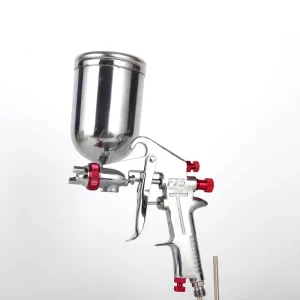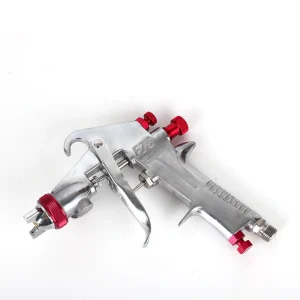Industrial spray guns are important tools for a variety of industries, from automotive to construction. Knowing the different types and features of spray guns can significantly impact the efficiency and quality of your project. This guide provides an overview of industrial spray guns, their types, key features, and tips for choosing the right spray gun for your needs.
Industrial Spray Gun Overview
Industrial spray guns are designed to spray coatings, paints, and other materials efficiently. These tools are essential for industries that require high-quality finishes and precision spraying. Whether you’re working in automotive refinishing, furniture manufacturing, or large-scale construction, choosing the right spray gun can increase productivity and provide superior results.
Types of Industrial Spray Guns
Understanding the different types of industrial spray guns can help you choose the best tool for a specific application:
1. Airless Spray Guns
Airless spray guns create a fine mist by using a high-pressure pump to spray paint through a nozzle. They are ideal for spraying thick coats and are known for their efficiency in quickly covering large surfaces. These spray guns are often used for applications that require a large number of coats, such as exterior paint and industrial coatings.
2. HVLP (High Volume Low Pressure) Spray Guns
HVLP spray guns use low-pressure, high-volume air to atomize paint, resulting in a more controlled, finer spray. This type of spray gun is ideal for achieving a smooth finish with less overspray. HVLP spray guns are widely used in automotive painting and furniture painting because they provide a high-quality finish with minimal waste.
3. Electrostatic Spray Guns
Electrostatic spray guns charge paint particles so that they are attracted to grounded surfaces. This method ensures a more even, efficient application with less overspray and material waste. Electrostatic spray guns are particularly useful for spraying metal parts and achieving a uniform finish.
4. Conventional Spray Guns
Conventional spray guns use compressed air to atomize paint and are known for their versatility. They can be used in a variety of applications, including automotive refinishing and woodworking. These spray guns are appreciated for their reliability and ability to provide a variety of spray patterns.
Key Features to Consider
When choosing an industrial spray gun, several features should be evaluated to ensure you get the best tool for your needs:
1. Spray Patterns and Nozzle Size
Different spray patterns (fan, cone, etc.) and nozzle sizes can affect application technique and results. Fan patterns are great for wide surfaces, while cone patterns are great for detail work. Choose your nozzle size based on the type of material you’re spraying and the desired effect.
2. Material Compatibility
Make sure the spray gun you choose can handle the type of material you plan to use, whether it’s paint, coating, or something else. Some spray guns are designed for specific materials, so verifying compatibility can prevent issues and ensure optimal performance.
3. Pressure and Flow Rate
Understanding PSI (pounds per square inch) and GPM (gallons per minute) is essential to choosing a spray gun that meets your application needs. Higher pressures and flow rates are ideal for thicker coatings and larger surfaces, while lower flow rates are better for fine work.
4. Ergonomics and Build Quality
Comfort and durability are critical when using a spray gun for extended periods of time. Look for ergonomic designs that reduce hand fatigue and high-quality materials that can withstand heavy use. Manufacturing quality affects the life and reliability of a tool.
Additional Features
1. Adjustability
Adjustable settings, such as flow control and spray pattern adjustments, provide greater flexibility and precision in your application. Features that allow you to modify the performance of your spray gun can enhance your ability to achieve the results you want.
2. Easy Maintenance and Cleaning
Choosing a spray gun that is easy to clean and maintain will save time and effort. Look for features such as quick-detach nozzles and easily accessible components to simplify the maintenance process.
3. Portability and Weight
For on-site or mobile work, consider the portability and weight of the spray gun. A spray gun that is lightweight and easy to handle can increase efficiency and reduce operator stress.
Choosing the Right Spray Gun for Your Application
1. For Heavy-Duty Industrial Use
If you need a spray gun for heavy-duty applications, focus on features such as high pressure, durable construction, and high flow rates. Airless spray guns are often a good choice for these applications due to their efficiency and ability to handle thick coatings.
2. For Smaller or Specialized Jobs
For smaller or more specialized tasks, such as automotive detailing or furniture finishing, an HVLP or conventional spray gun may be more suitable. These guns offer precision and control, allowing for a high-quality finish in detailed work.
Budget Considerations
1. Cost vs. Features
Balancing cost with features is crucial when purchasing an industrial spray gun. Consider what features are essential for your work and how they align with your budget. Higher-end models may offer advanced features but assess whether these align with your actual needs.
2. Long-Term Value
Evaluate the durability and warranty of the spray gun. A well-built, reliable gun may cost more upfront but can provide better long-term value through fewer replacements and repairs.
China Industrial Spray Gun Supplier
If you want to get high-quality industrial spray guns, you might as well try sprayguntool. As a professional Chinese industrial spray gun supplier, sprayguntool can provide you with high-quality products and services. Welcome to contact us for detailed ordering information!






